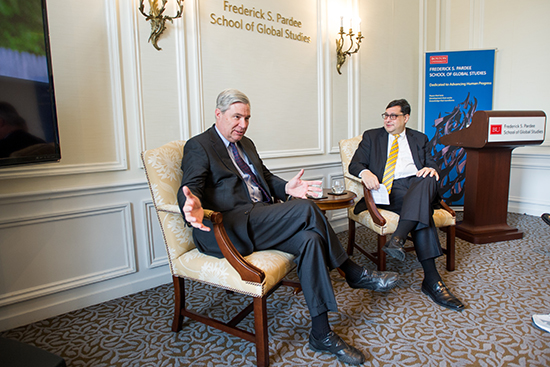Sen. Whitehouse Talks Climate Change
U.S. Senator Sheldon Whitehouse (D-R.I.) visited the Frederick S. Pardee School of Global Studies on May 4, 2016 to talk about climate change, and next steps for the United States and international community following the 2015 Paris Climate Agreement.
Sen. Whitehouse met with Boston Univeristy President Robert Brown prior to the discussion. Pardee School Dean Adil Najam introduced Sen. Whitehouse, and praised him for his efforts to reconcile partisan differences on climate change.
“Senator Whitehouse has been a leader on climatic and environmental affairs, and a leader most importantly in trying to bring together the coalition that often seems very difficult to bring together and in breaking the ideological logjam which often seems to have less to do with the substance of the issues than just how we have been instructed in our body politic,” Najam said.
Sen. Whitehouse, who has championed efforts to reduce carbon pollution and position Rhode Island as a leader in the clean energy economy, emphasized the importance of involving as many stakeholders as possible in climate talks following the Paris discussions.
“A lot of this has to be about making sure that the room where it happens has more voices in it and they persist,” Sen. Whitehouse said. “Democracy, if you exclude people from the room where it happens, you can get a short term victory but you haven’t really put democracy to the test of bringing opposing forces together and reaching consensus or compromise.”
After opening remarks, Sen. Whitehouse opened up the conversation to the audience which included Pardee School faculty and students as well as faculty from other Boston schools.
According to Sen. Whitehouse, the Paris climate agreement provides accountability for countries in terms of meeting goals to address global warming.
“Paris sets a very, very high standard and for the first time it puts countries on public record as to what they are going to do,” Sen. Whitehouse said. “There may not be enforcement, but there is naming and shaming and there is failure versus success and that will matter.”
Moving forward, Sen. Whitehouse said it will be crucial to continue to address climate change denial rhetoric that is still being perpetuated by the fossil fuel industry.
“It’s hard to grapple with different levels of fossil fuel and other carbon and greenhouse gas emissions when the people you talk to are having trouble agreeing with the fundamental premise,” Whitehouse said. “That’s really our challenge — to try to break through the fundamental denial.”
